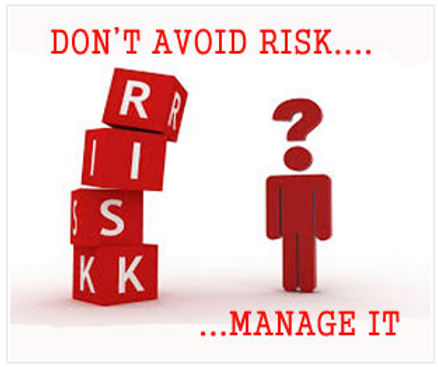
Investment Risk or Outcome Uncertainty ??
Understanding the difference between risk and uncertainty will be the key determinant to your success as an investor and possibly your success in life!
Ever stop to think about your emotions to risk? How you truly define risk? Do you view as possibility of failure or possibility of uncertainty? If you view risk as uncertainty or the possibility of uncertainty, I would like to challenge your thought process for a moment. Contrary to what the media communicates or perhaps the world for that matter, uncertainty does NOT = risk. Uncertainty simply equals a larger set of potential outcomes. Somehow, our society has switched from identifying risk as possibility of failure (good thing for survival of human race) and instead we are defining risk as possibility of uncertainty which is by definition 100% every day we live.
Rather than explaining myself, let me share some commentary from renowned author Seth Godin. This is a powerful communication of risk and is fundamental to smart investing and to living your life.
————————————————————————-
Uncertainty is not the same thing as risk – Blog of Seth Godin
Often, the most important work we do doesn’t bring a guaranteed, specific result. Usually, the result of any given action on our part is unknown.
Uncertainty implies a range of possible outcomes.
But a range of results, all uncertain, does not mean you are exposing yourself to risk. It merely means you’re exposing yourself to an outcome you didn’t have a chance to fall in love with in advance.
A simple example: the typical high school student applying to a range of colleges has very little risk of getting in nowhere. Apply to enough schools that match what you have to offer, and the odds are high indeed you’ll get in somewhere. Low risk but a very high uncertainty about which college or colleges will say yes.
That’s not risky. That’s uncertain. It takes fortitude to live with a future that’s not clearly imagined, but it’s no reason not to apply.
Another example: If you speak to 100 people, it’s uncertain which 40 people will be impacted by what you say. But the risk that you will resonate with no one is small indeed.
The question to ask every organization, manager, artist or yourself is, “are you hesitating because you’re not sure the future will match your specific vision, or is there truly a project-endangering risk here?”
————————————————————————-
Investing takes a certain amount of fortitude. Accepting less clarity comes with potential for wonderful long term gains. However, sometimes we misuse the word RISK for Uncertainty. If we train ourselves to start associating uncertainty for risk we can become emotional and perhaps make less than logical decisions at points. Both investing and in life!
At the beginning of the year uncertainty was everywhere…still is. And yet our managed accounts have done very well for clients. Uncertainty and an infinite number of possibilities exist in the short term for investors. When you allow your mind to process uncertainty, just remember above examples and be careful to not allow uncertainty to equal risk. Here are just a few uncertain 30 year periods and corresponding annual returns as represented by the S&P 500.
1926-1956 1956-1986 1986-2016
+10.77% Stock Returns +9.63% Stock Returns +9.99% Stock Returns
———————————————————————————————————————-
Some corresponding uncertainty during above periods – helps put todays concerns in healthier perspective!
Great depression with a stock crash over 80%, WW II, Korean War, Civil Rights, Vietnam, assassinations, oil price shocks, double digit inflation and double digit interest rates, 6 recessions just from 1956 to 1986 alone, black Monday, Savings and Loan crisis, terrorism, 9/11, dessert storm and 3 more recessions from 1986 to 2016.
———————————————————————————————————————-
I write all this to highlight the growing uncertainty we face in the market and the possible outcomes long term. I do not view the long term as very risky but would be foolish to act as if the next 3 years embraces any sort of certainty, then again has the market ever embraced certainty? The data as shown by leading recession indicators still looks fairly calm. The economy continues to grow, albeit slowly and companies continue to innovate and plow forward. However, we are seeing some signs of early economic decline. One of the best signals of an impending recession has been medium and heavy truck sales. Anytime that’s dropped substantially – and the 31% drop since June 2015 certainly qualifies – a recession has started within two years of the peak in sales. If that holds this time around, we’d be due for a recession starting by the middle of 2017. Of course this data was somewhat inflated due to the fracking boom and perhaps is simply returning to the norm. Other data such as core industrial declines also point to pressure on our economy. The pressures could revert as they have at times, but we are keeping a very close eye on the “data” signs of trouble ahead. Next month we will dive into a deeper quarterly review and discuss what we should do as investors to prepare for a possible recession and the current opportunities we are finding as the economy moves forward.
“Look at market fluctuations as your friend rather than your enemy; profit from folly rather than participate in it.” – Warren Buffet
Evergreen Wealth Management, LLC remains committed to providing customized financial planning &investment solutions. We thank each of you for the trust you place in allowing us to steward your assets and financial goals.
Important Disclosures
Evergreen Wealth Management, LLC is a registered investment adviser. Information presented is for educational purposes only and does not intend to make an offer or solicitation for the sale or purchase of any specific securities, investments, or investment strategies. Investments involve risk and unless otherwise stated, are not guaranteed. Be sure to first consult with a qualified financial adviser and/or tax professional before implementing any strategy discussed herein. Past performance is not indicative of future performance. Index results do not reflect management fees and expenses and you cannot typically invest in an index.
